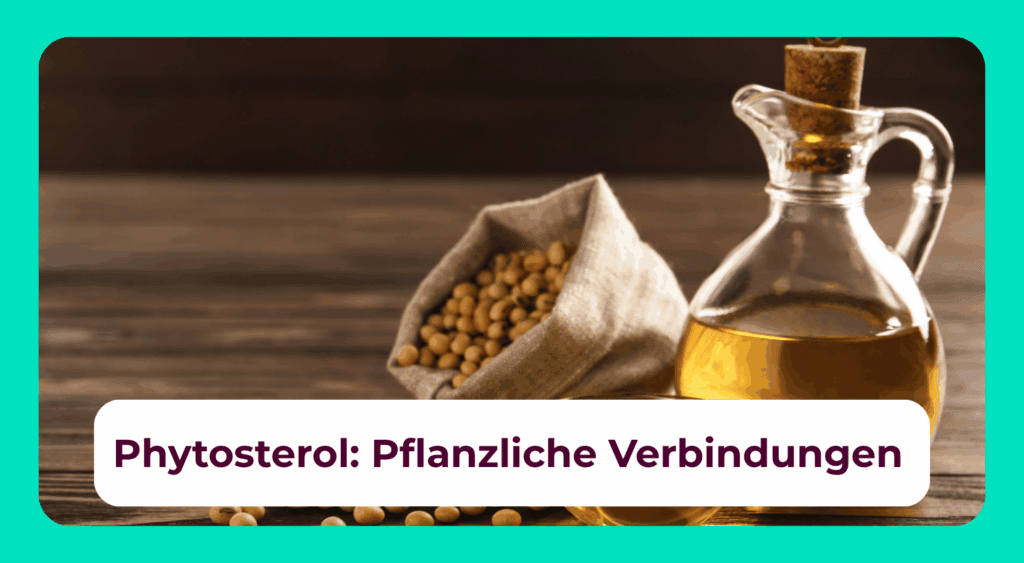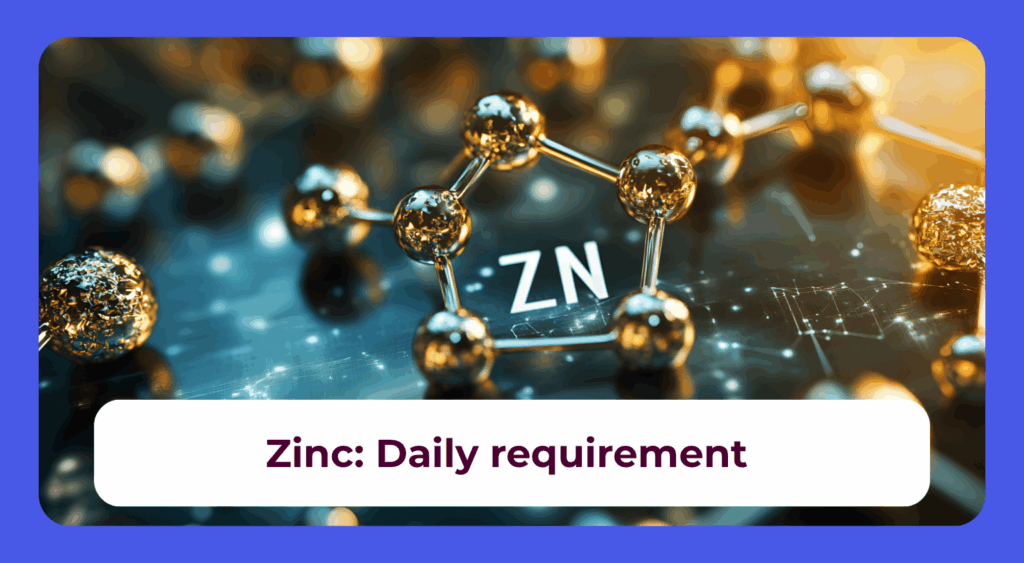Phytosterols are a group of chemical compounds that occur naturally in plants. They inhibit the absorption of cholesterol in the intestine and therefore help lower LDL cholesterol levels. That is why they are used as an active ingredient in medications and dietary supplements, as well as for enriching foods. Due to possible side effects, it is important to avoid excessive intake.
Phytosterol at a glance
- Phytosterols can help maintain normal cholesterol levels.
- Medications containing phytosterols are used to alleviate the symptoms of benign prostate enlargement.
- Phytosterols are mainly found in high-fat plant foods such as nuts, seeds and vegetable oils.
- Individuals with high cholesterol levels can consume foods fortified with additional plant sterols.
- In the case of an overdose and certain genetic defects, phytosterols can have various side effects.
What is role of phytosterols?
The structure of phytosterols is similar to that of cholesterol. As a result, they can inhibit cholesterol absorption in the intestine. This triggers an increase in the body’s own cholesterol production. Nevertheless, LDL and total cholesterol levels decrease slightly if a sufficient amount of these plant-based compounds is consumed. According to scientific studies, this effect begins with an intake of 1.5 to 2 grams per day.123 HDL cholesterol and triglycerides do not change as a result of ingestion.
Phytosterol for men with an enlarged prostate
Phytosterol is also used as an active ingredient in medicines to alleviate the symptoms associated with benign prostate enlargement. Supplements for this purpose contain significantly lower doses than those used to reduce cholesterol levels. Capsules containing 10 or 65 mg of the active ingredient are commonly used.
What foods contain phytosterols?
Phytosterols are found in many plant-based foods. Larger quantities are especially present in plant components with a high fat content. In contrast, fruits and vegetables that are low in fat contain only small amounts of phytosterols.
The following foods are naturally rich in plant sterols, for example:
- Legumes such as soybeans
- Sunflower seeds, pumpkin seeds, and other types of seeds
- Vegetable oils such as rapeseed and soybean oil
- Grain germ
- Nuts

Plant sterols in fortified foods
Due to their cholesterol-lowering effect, various foods are enriched with phytosterols. These include, for example, margarine as well as milk and dairy products. The phytosterol content of these products is adjusted so that a typical portion provides a clinically effective daily dose. This is significantly more than what is typically consumed through a regular diet.
Therefore, these foods must be appropriately labeled.
Are plant sterols healthy?
Under certain conditions, plant sterols can have a positive effect on health. However, this only applies if there is a need for supplementation and no excessive intake occurs. According to the EU authority EFSA (European Food Safety Authority), which is responsible for food safety, the daily intake should not exceed three grams.4
Fortified foods should only be consumed if cholesterol levels are confirmed to be elevated. Healthy individuals should generally avoid them. Anyone already taking cholesterol-lowering medication should only consume them after consulting a physician.5
Want to Explore the Future of Nutrition?
Discover how genetic testing can provide in-depth insights into vitamin and mineral needs. Partnering with Novogenia opens the door to offering advanced, personalised health recommendations based on genetics. As an expert in nutrigenetics, Novogenia equips businesses with the tools to elevate their health services.
By becoming a Novogenia partner, you’ll gain access to cutting-edge genetic analyses, enabling you to offer your customers highly customised health solutions. With Novogenia’s support, businesses can stand out in the growing field of personalised nutrition, building customer loyalty and expanding service offerings. Take the next step in transforming health services and unlocking the full potential of nutrigenetics.
Does phytosterol have side effects?
Phytosterols can cause a range of side effects. Occasionally, they lead to symptoms such as nausea and skin rashes. They also impair the absorption of fat-soluble vitamins and carotenoids. For this reason, fortified foods and supplements are not suitable for young children or pregnant and breastfeeding women.
In addition, there are indications that a high phytosterol intake may promote cardiovascular disease. Although phytosterols help lower cholesterol, their structure is similar to that of cholesterol. As a result, they may also build up in blood vessels and promote the development of atherosclerosis.6
Impaired phytosterol uptake due to genes
Rare mutations in the ABCG5 and ABCG8 genes can lead to excessive absorption of phytosterols. Anyone affected by this genetic condition, known as phytosterolemia, should strictly limit their intake of phytosterols.7
Phytosterole in creams
Rare mutations in the ABCG5 and ABCG8 genes can lead to increased uptake of phytosterols. As an ingredient in creams, for example, they are believed to help improve skin elasticity and moisture. S Studies have shown that they can support skin repair, among other benefits.8 The use of phytosterols in care products is considered safe. They typically do not cause adverse effects such as skin irritation.
When is phytosterol supplementation appropriate?
Phytosterol supplements can be beneficial in certain situations. To avoid undesirable side effects, intake, and dosage should always be personalized. If in doubt, a primary blood test can be helpful. A blood analysis can be used to check cholesterol levels and determine whether phytosterol supplementation is necessary.
Important to know
If you are not a healthcare professional and experience symptoms, have existing health conditions, or suspect a deficiency, consult a physician.
- 1 – European Food Safety Authority: Gesundheitsbezogene Angaben zur Senkung von Blutcholesterin mit Phytosterinen können jetzt anhand neuer wissenschaftlicher Empfehlungen der EFSA geprüft werden (Veröffentlichung: 31.07.2009). URL: https://www.efsa.europa.eu/de/press/news/blood-cholesterol-reduction-health-claims-phytosterols-can (zuletzt aufgerufen am: 28.11.2024).
- 2 – Ting Wu, Jia Fu, Yuexin Yang, Lishi Zhang, Junhua Han: The effects of phytosterols/stanols on blood lipid profiles: a systematic review with meta-analysis (Veröffentlichung: 2009). URL: https://pubmed.ncbi.nlm.nih.gov/19713176/ (zuletzt aufgerufen am: 28.11.2024).
- 3 – Kathy Musa-Veloso, Theresa H Poon, Julie Ann Elliot, Catherine Chung: A comparison of the LDL-cholesterol lowering efficacy of plant stanols and plant sterols over a continuous dose range: results of a meta-analysis of randomized, placebo-controlled trials (Veröffentlichung: 2011). URL: https://pubmed.ncbi.nlm.nih.gov/21345662/ (zuletzt aufgerufen am: 28.11.2024).
- 4 – European Food Safety Authority: Consumption of Food and Beverages with Added Plant Sterols (Veröffentlichung: 2008). URL: https://www.efsa.europa.eu/en/efsajournal/pub/rn-133 (zuletzt aufgerufen am: 28.11.2024).
- 5 – Bundesinstitut für Risikobewertung: Fragen und Antworten zu Pflanzensterinen (Stand: 25.06.2007). URL: https://www.bfr.bund.de/de/fragen_und_antworten_zu_pflanzensterinen-9503.html (zuletzt aufgerufen am: 28.11.2024).
- 6 – Markus Scholz et al.: Genome-wide meta-analysis of phytosterols reveals five novel loci and a detrimental effect on coronary atherosclerosis (Veröffentlichung: 10.01.2022). URL: https://www.nature.com/articles/s41467-021-27706-6 (zuletzt aufgerufen am: 28.11.2024).
- 7 – Bridget O Ajagbe, Rgia A Othman, Semone B Myrie: Plant Sterols, Stanols, and Sitosterolemia (Veröffentlichung: 2015). URL: https://pubmed.ncbi.nlm.nih.gov/25941971/ (zuletzt aufgerufen am 28.11.2024).
- 8 – Ichiro Iwai et al.: The human skin barrier is organized as stacked bilayers of fully extended ceramides with cholesterol molecules associated with the ceramide sphingoid moiety (Veröffentlichung: 2012). URL: https://pubmed.ncbi.nlm.nih.gov/22534876/ (zuletzt aufgerufen am: 28.11.2024).




